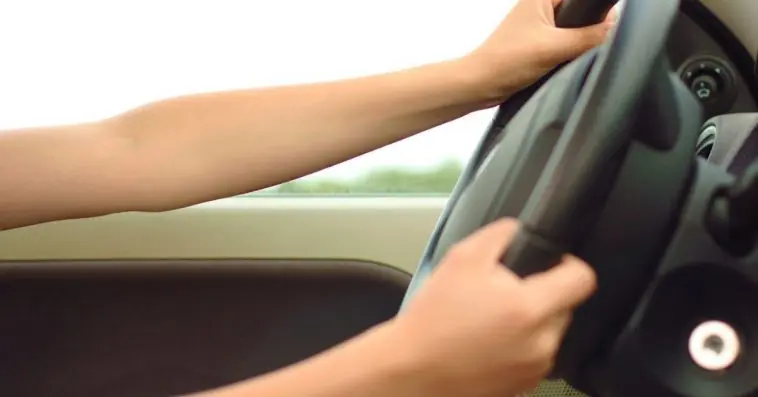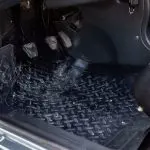If you’ve ever been cruising down the road and had your steering wheel lock-up out of the blue, you’ll know it can be one of the most frightening, panic-inducing moments of your life.
While this is a fairly rare occurrence, it does happen now and then all the same. Since the steering wheel is one the most integral components of your vehicle, it’s understandable why losing control of it can send you into a frenzy.
In the following sections, we’ll be reviewing the causes behind why a steering wheel can get locked up while driving and what you can do to avoid it.
TABLE OF CONTENTS
How Does A Steering Wheel Lock Up?
Just because your steering wheel has locked up doesn’t necessarily mean there’s a major problem with your vehicle. Steering wheels are meant to lock up in a few situations mostly as a safety measure.
Your steering wheel usually gets unlocked when you insert your key into the ignition keyhole. So, having your steering wheel stay locked up without your key is the best way to prevent thieves from stealing your car.
However, your car could suffer certain mechanical and system issues now and then which cause your steering wheel to lock up in unexpected conditions. The worst of these conditions would be when you’re driving.
Often your car could start when you insert the key into the ignition keyhole but your steering wheel remains unlocked.
This does not always indicate a major issue with your car and with the help of a mechanic, you could well have a solution within minutes.
What Causes A Steering Wheel To Lock Up?
There are a host of different reasons that could cause your steering wheel to lock up when you least want it to.
In this section, we’ll discuss a few of the most common reasons for the same.
1. A Faulty Steering Pump
If you have power steering, the pump can get jammed with no warning. This is both dangerous and alarming for most vehicle owners.
This is likely the most common of all reasons behind steering wheels getting locked up while driving.
Most vehicles now have a pump for power steering which is why this is such a common reason behind the steering wheel getting locked up.
The pump is necessary for allowing the steering wheel to make smooth turns so it can’t exactly be done away with.
If the cause behind your steering wheel failure is indeed the pump, it’s likely because of debris that’s been lodged in it.
The pump does have several valves and attachments that could provide plenty of room for debris to accumulate.
Though the power steering provides a smoother and more comfortable alternative to turning your wheel with your arms, it can pose a major problem if it locks up while you’re driving.
If your engine shuts off unexpectedly when you’re on the road for any reason, the power steering pump dies off as well. You can see why this can put you in an extremely precarious position.
But how do you identify when your power steering pump has been damaged? It’s quite simple; you’ll need to watch out for a couple of signs.
Firstly, you’ll notice a strange sound emanating from the hood of your car that sounds somewhat like a whine.
The second and more obvious sign is a delayed response from your steering wheel as you attempt to turn it.
If you notice either of these signs you should pull over right away and wait for help to arrive.
2. An Issue with The Lock Bar
The steering lock bar is what locks your car when you park it and turn off the engine. It’s an important component of the steering wheel and since it’s used so frequently, it’s understandable why wear and tear can cause it considerable damage.
However, the more common reason behind a lock bar issue is a possible factory defect.
If your lock bar has even a slightly crooked casting, it can cause your steering wheel to get locked while you’re on the road. A crack in the lock bar is the general indicator of a factory defect.
As basic as such an error may seem it is truly surprising how common it is even among some of the most trusted vehicle manufacturers.
As the crack in your steering lock grows larger and larger with time, you’ll be at a greater risk of facing issues while driving.
Another factor that can cause damage to your steering lock is sharp turning. If you constantly make sharp turns, your lock bar will get damaged, perhaps permanently.
3. Rash Driving
One of the worst things you can do while driving is to make a sudden or sharp turn. Maneuvering your vehicle this rashly can cause problems with your steering system both in the short and long run.
If you find yourself constantly making sharp turns, chances are you’ve encountered issues with your steering wheel already. This is especially true if you make several sharp turns within the same trip.
Making sharp turns is especially harmful to your car because it can affect the transmission. This can damage your engine and cause your steering wheel to lock up sooner or later.
Rough turning can also cause your power steering pump to get stuck. The best thing you can do to avoid this situation altogether is, of course, to drive more carefully.
Slowing down and making gentle but firm turns can save you from a fatal accident and keep your steering wheel working just fine.
4. Ignition Lock
If your car is facing some issue and you find yourself unable to turn off the engine with your key, it could spell trouble for your steering wheel. In such a situation, it’s your ignition that locks up.
This kind of sudden lock up is one of the most dangerous problems you could face while on the road. Driving at high speed when this takes place is especially lethal and every effort should be made to avoid it at all costs.
If you detect any signs of an ignition failure, you should contact a mechanic as soon as possible. This is not an issue you can sort out for yourself without professional help and it would be unwise to try.
5. Issues With The ECU (Engine Control Unit)
The basic, most important activities performed by your car’s engine are managed by the Engine Control Unit or ECU. ECU is a fixed system and will need to be checked every so often to ensure it’s working properly.
If it isn’t, it could cause some major issues with your steering wheel. This is mainly because the ECU controls your steering lock system.
The sensory issues that arise from a faulty engine control system can make driving quite difficult for you if not taken care of in time.
6. A Damaged Steering Column
A damaged or faulty steering column would cause maneuvering difficulties and make your car challenging to operate. The steering column is what connects your steering system to the steering wheel.
This component is located right at the top of your steering system. It’s your steering column that allows you to lead your car in the direction you’d like it to go. This is why a faulty steering column can cause major difficulties while driving.
A bad steering column could create issues with the locking up of your steering wheel as well. While the locking up can be minor at the best of times, it can lead to dangerous results if you’re driving at a high speed or in a highly-populated area.
It’s best to get your steering column checked by a mechanic before it’s too late.
7. Other Issues
There are several other issues besides the ones we’ve mentioned above which can cause your car’s steering wheel to lock up. We’ll discuss a few of these in this section.
- Damaged ignition wires
- Spark plug issues
- Not enough fuel delivery pressure
- Insufficient fluid levels in the power steering
- Stoppage in the power steering pump caused by internal failure
- A defect in the power steering belt
- A fault with the camshaft position sensors
- Wrong temperature levels of the engine’s coolant
How To Deal With A Locked Steering Wheel
In this section, we’ll go through some of the most effective ways in which you can ensure your steering wheel does not get locked while you’re driving.
Make sure you go through each of these methods carefully as you never know which one of them might end up saving your life.
Check For Debris
Unwanted dirt and debris can get into almost any component of your car and your steering wheel is no exception. Once lodged inside, the debris can get in the way of your steering column.
If this happens, you have a big problem on your hands and you won’t be able to handle it by yourself. You’ll need to call a mechanic to check if there are any problems with the circuit.
Check Your Car’s Wiring
A fault with the wiring system too can cause problems with your steering wheel. If your engine is exposed to too much heat or faulty wiring, it could cause your car battery to short.
A short can lead to an ignition system malfunction which could impact your steering lock. This is quite easy to detect if it happens as it’ll give rise to smoke or other visible signs of burning.
The best course of action to take in such a scenario would be to disconnect your battery before you contact a professional.
Replace Your Power Steering Pump
As mentioned in an earlier section, a fault with your power steering pump is one of the main reasons behind your steering wheel getting locked up unexpectedly.
If you hear strange sounds from the hood of your car and are suspecting trouble from the power steering pump, start working on getting it replaced.
Unless you have mechanical knowledge and skill, it is not recommended that you change the pump by yourself. It might save you a few bucks but it can do more harm than good if you’re not up to the task.
Check The Ignition Switch Cylinder
An issue with your ignition cylinder too can cause trouble with the steering wheel locking up. The easiest and most straightforward method of checking your ignition switch cylinder is to test it manually.
You can use your left hand to disturb the cylinder and your right hand to try and disengage the steering wheel lock. You can even use your right hand simultaneously to turn the ignition key to the start position.
If you find any dirt or debris in the cylinder, you’ll need to dislodge it using special tools such as canned air. The canned air you use should have a small enough nozzle to fit into the ignition cylinder.
However, if you find your steering wheel staying firmly locked despite these efforts, you should consider replacing your ignition cylinder altogether.
Maintain The Fluid Level Of Your Power Steering
Your power steering requires hydraulic fluid to function. This fluid is typically colorless and resides in a clear reservoir located in the engine bay. This reservoir is usually about 75 mm in diameter.
If you experience issues with your steering wheel due to the power steering system, you may want to check and see the level of the fluid contained inside the reservoir.
You can check it by referring to the maximum and minimum level indicators on either side of the reservoir.
A fault in one of your car’s steering pipes can cause this fluid to leak and drop below the minimum level. If this happens, you’ll have to get the pipe (or pipes) patched up and fill the reservoir up with hydraulic fluid.
Conclusion
Even though having your steering wheel lock-up on the road can be a harrowing experience, you can take steps to ensure that this doesn’t happen again or deal with it effectively if it does.
Though you’d need a mechanic’s assistance to deal with a locked steering wheel in most cases, there are still various ways in which you can resolve the issue yourself and ensure it doesn’t happen again.




